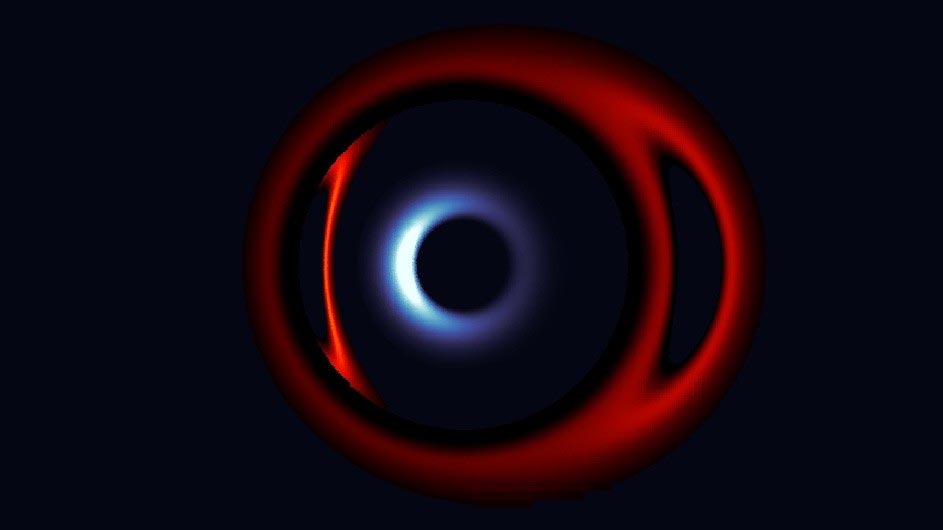
在这个超大质量黑洞合并的模拟中,离观察者最近的蓝移黑洞通过引力透镜使背景中的红移黑洞膨胀。 研究人员发现,当最近的黑洞从对应的阴影前面经过时,亮度明显下降,这一观察结果可用于测量黑洞的大小并测试替代的引力理论。 学分:乔迪·达维拉
在合并超大质量黑洞的过程中,一种测量真空的新方法
科学家们发现了一种方法来量化两个超大质量黑洞在碰撞过程中的“阴影”,为天文学家提供了一种潜在的新工具,用于测量遥远星系中的黑洞和测试替代引力理论。
三年前,第一张黑洞照片震惊了世界。 不知从何处冒出的黑洞,被一圈炽热的光环包围。 那标志性的形象[{” attribute=””>black hole at the center of galaxy Messier 87 came into focus thanks to the Event Horizon Telescope (EHT), a global network of synchronized radio dishes acting as one giant telescope.
Now, a pair of Columbia researchers have devised a potentially easier way of gazing into the abyss. Outlined in complementary research studies in Physical Review Letters and Physical Review D, their imaging technique could allow astronomers to study black holes smaller than M87’s, a monster with a mass of 6.5 billion suns, harbored in galaxies more distant than M87, which at 55 million light-years away, is still relatively close to our own Milky Way.
一对超大质量致密黑洞中引力透镜的模拟。 学分:乔迪·德瓦拉
这种技术只有两个要求。 首先,在合并过程中需要一对超大质量黑洞。 其次,您应该大致从一个侧面角度看这对。 从这个侧面看,当一个黑洞从另一个黑洞前面经过时,你应该能够看到一道明亮的闪光,因为黑洞的发光环被离你最近的黑洞放大了,这种现象被称为引力透镜。
透镜的效果是众所周知的,但研究人员在这里发现的是一个微妙的信号:与背景中黑洞的“阴影”相对应的特征性亮度下降。 这种微妙的变暗可以持续几个小时到几天,具体取决于黑洞的大小以及它们的轨道的纠缠程度。 研究人员说,如果你测量下降持续多长时间,你可以估计黑洞事件视界所产生的阴影的大小和形状,即没有出口的地方,没有任何东西可以逃逸,甚至光也没有。

在对一对超大质量合并黑洞的模拟中,距离观察者最近的黑洞越来越近,因此呈现蓝色(方框 1),通过引力透镜使后面的红移黑洞膨胀。 随着最近的黑洞将黑洞的光放大到更远的地方(方框 2),观察者会看到明亮的闪光。 但当最近的黑洞经过深渊或最远黑洞的阴影前时,观察者会看到亮度略有下降(方框 3)。 这种亮度下降 (3) 在图像下方的光变曲线数据中清晰可见。 学分:乔迪·德瓦拉
该研究的第一作者、哥伦比亚大学和熨斗计算天体物理中心的博士后 Jordi Davilar 说:“数十名科学家花费了数年时间和巨大的努力来制作 M87 黑洞的高分辨率图像。” “这种方法只适用于最大和最近的黑洞——M87核心的一对,可能还有我们的银河系。”
他补充说:“使用我们的方法,你可以测量黑洞随时间变化的亮度,不需要在空间上解析每个物体。应该可以在许多星系中找到这个信号。”
黑洞的影子是它最神秘和最具启发性的特征。 哥伦比亚大学物理学教授、合著者佐尔坦·海曼说:“那个黑点告诉我们黑洞的大小、周围时空的形状,以及物质如何落入黑洞视界附近。”

当从侧面观察超大质量黑洞并合时,距离观察者最近的黑洞会在引力透镜的作用下将黑洞扩大到更远的地方。 研究人员检测到与远处黑洞的“阴影”相对应的亮度短暂下降,从而使观察者能够测量其大小。 学分:尼科莱塔·巴罗尔维尼
黑洞的阴影可能隐藏着引力的真实本质,引力是我们宇宙的基本力量之一。 爱因斯坦的引力理论,即广义相对论,预测了黑洞的大小。 因此,物理学家寻找它们来测试替代的引力理论,以努力调和关于自然如何运作的两种相互竞争的观点:爱因斯坦的广义相对论,它解释了诸如行星自转和宇宙膨胀等大尺度现象,以及量子物理学,它解释了电子和光子等小粒子如何同时占据多个状态。
研究人员开始对接下来点燃超大质量黑洞感兴趣 领班 早期宇宙中遥远星系中心的一对疑似超大质量黑洞。[{” attribute=””>NASA’s planet-hunting Kepler space telescope was scanning for the tiny dips in brightness corresponding to a planet passing in front of its host star. Instead, Kepler ended up detecting the flares of what Haiman and his colleagues claim are a pair of merging black holes.
They named the distant galaxy “Spikey” for the spikes in brightness triggered by its suspected black holes magnifying each other on each full rotation via the lensing effect. To learn more about the flare, Haiman built a model with his postdoc, Davelaar.
They were confused, however, when their simulated pair of black holes produced an unexpected, but periodic, dip in brightness each time one orbited in front of the other. At first, they thought it was a coding mistake. But further checking led them to trust the signal.
As they looked for a physical mechanism to explain it, they realized that each dip in brightness closely matched the time it took for the black hole closest to the viewer to pass in front of the shadow of the black hole in the back.
The researchers are currently looking for other telescope data to try and confirm the dip they saw in the Kepler data to verify that Spikey is, in fact, harboring a pair of merging black holes. If it all checks out, the technique could be applied to a handful of other suspected pairs of merging supermassive black holes among the 150 or so that have been spotted so far and are awaiting confirmation.
As more powerful telescopes come online in the coming years, other opportunities may arise. The Vera Rubin Observatory, set to open this year, has its sights on more than 100 million supermassive black holes. Further black hole scouting will be possible when NASA’s gravitational wave detector, LISA, is launched into space in 2030.
“Even if only a tiny fraction of these black hole binaries has the right conditions to measure our proposed effect, we could find many of these black hole dips,” Davelaar said.
References:
“Self-Lensing Flares from Black Hole Binaries: Observing Black Hole Shadows via Light Curve Tomography” by Jordy Davelaar and Zoltán Haiman, 9 May 2022, Physical Review Letters.
DOI: 10.1103/PhysRevLett.128.191101
“Self-lensing flares from black hole binaries: General-relativistic ray tracing of black hole binaries” by Jordy Davelaar and Zoltán Haiman, 9 May 2022, Physical Review D.
DOI: 10.1103/PhysRevD.105.103010

“创作者。屡获殊荣的问题解决者。音乐布道者。无法治愈的内向。”





More Stories
詹姆斯·韦伯太空望远镜检测到超大质量黑洞附近的冲击(图片)
研究表明,富含水果和蔬菜的饮食可以降低患心脏病和肾脏疾病的风险
中国的巨大陨石坑里有“天堂”森林,其中的植物适应了严酷的地下生活